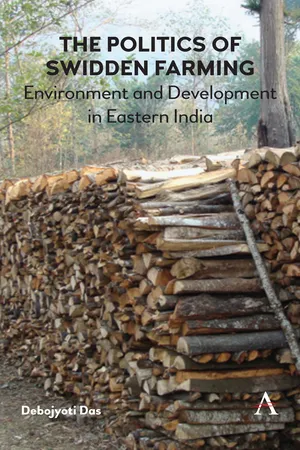
The Politics of Swidden Farming
Environment and Development in Eastern India
- 272 pages
- English
- ePUB (mobile friendly)
- Available on iOS & Android
About this book
The Politics of Swidden Farming offers a new explanation for the changes taking place in swidden farming practised in the highlands of eastern India through an ethnographic case study. The book traces the story of agroecological change and state intervention to colonial times, and helps understand contemporary agrarian change by contextualizing farming not just in terms of the science and technology of agriculture or conservation and biodiversity but also in terms of technologies of rule. The Politics of Swidden Farming adds a new dimension to the underdeveloped literature on shifting cultivation in South Asia by focusing on the social ecology of farming and agrarian change in the hills. It provides a comparative viewpoint to state-centred and donor-driven development in the frontier region by bringing in different actors and institutions that become the actants and agents of social change.
Frequently asked questions
- Essential is ideal for learners and professionals who enjoy exploring a wide range of subjects. Access the Essential Library with 800,000+ trusted titles and best-sellers across business, personal growth, and the humanities. Includes unlimited reading time and Standard Read Aloud voice.
- Complete: Perfect for advanced learners and researchers needing full, unrestricted access. Unlock 1.4M+ books across hundreds of subjects, including academic and specialized titles. The Complete Plan also includes advanced features like Premium Read Aloud and Research Assistant.
Please note we cannot support devices running on iOS 13 and Android 7 or earlier. Learn more about using the app.
Information
Table of contents
- Cover
- Half Title
- Title Page
- Copyright Page
- Dedication
- Contents
- List of Illustrations
- Foreword
- Acknowledgements
- List of Abbreviations
- 1. Introduction
- 2. Methodology and Fieldwork: Negotiating Hazardous Fields
- 3. Ethnography, Violence and Memory: Telling Violence in the Naga Hills
- 4. Jhum and the ‘Science of Empire’: Ecological Discourse, Ethnographic Knowledge and Colonial Mediation
- 5. Land and Land-Based Relations in a Yimchunger Naga Village: From Book View to Field View
- 6. The Politics of Time: The Missionary Calendar, the Protestant Ethic and Labour Relations among the Eastern Nagas
- 7. Micro-Politics of Development Intervention: Village Patrons, Community Participation and the NEPED Project
- 8. Conclusion
- Notes
- Bibliography
- Index